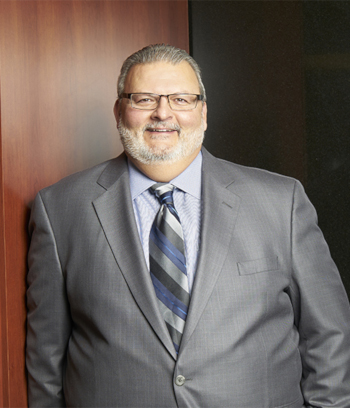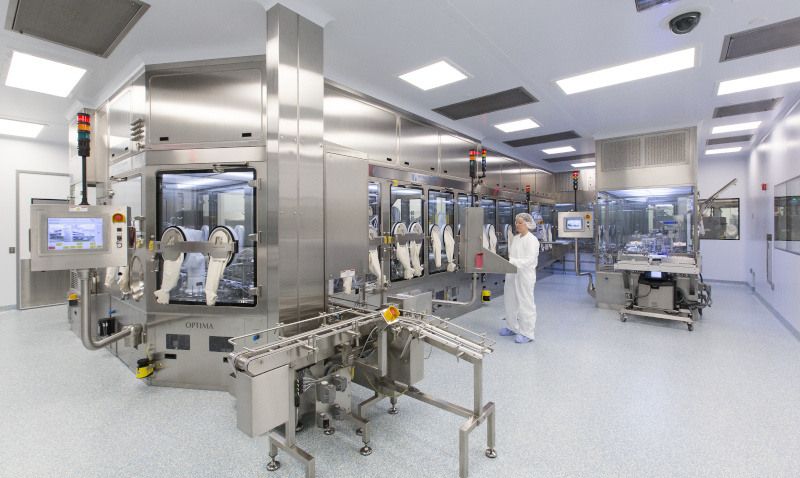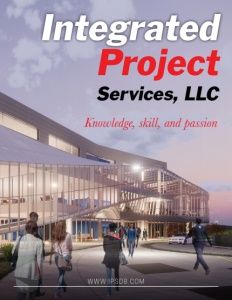Integrated Project Services, LLC
Knowledge, skill, and passion
Business View Magazine interviews Mark Butler, President of Integrated Project Services, LLC (Americas), for our focus on Manufacturing Technology.
Integrated Project Services, LLC (IPS) is one of the fastest-growing companies in the Architecture, Engineering, and Construction (AEC) industry with a global reach that spans over nine countries in four continents. Three cornerstones – Knowledge, Skill, and Passion – fuel the growth and collaborative environment that propels this highly innovative business. IPS was founded in 1989, as a unique firm focused on aligning services with the business drivers of its clients and delivering projects on an integrated design/build platform. Bold for its time back then, the firm has continued to develop, execute, and advance a wide array of strategies to reach its current global status.

Mark Butler, President & Managing Director
In 2007, under new executive leadership led by Dave Goswami, the organization transitioned from an execution-based company to a knowledge-based company and has since built an extensive roster of industry-recognized Subject Matter Experts (SMEs), who not only design and construct facilities, but are also skilled problem solvers for clients. Today, IPS remains at the forefront of new technologies and innovations in the industry. The company’s success has been well-earned through knowledge leadership, listening to the needs and challenges of clients, and providing integrated project and business solutions to help them create and manufacture life-impacting products.
Business View Magazine recently spoke with Mark Butler, President & Managing Director of the Americas division of Integrated Project Services, about the company’s innovative solutions approach and his insights into the future of IPS and the ever-evolving biotech and life science market. The following is an edited transcript of that conversation.
BVM: Can you share the background history on Integrated Project Services?
Butler: “IPS is now in its 31st year of operation and is an integrated engineering construction validation company focused in the pharmaceutical life science market. The firm was founded by two pharmaceutical executives who created a business plan to disrupt the capital execution delivery in the life science space. Back when the company was founded in the ‘80s, in the life science pharmaceutical marketplace you tended to have an architect, an engineer, a construction manager, a validation company, and a host of contractor vendors providing equipment to the capital expansion project.
“Our founders noticed that at the end of projects, there wasn’t one go-to person. The supply chain was fragmented in such a way that you would have a lot of finger pointing on responsibilities. So, what they envisioned was an integrated firm that could build and validate the complex facilities for the life science market. IPS has now taken a journey to about 1,400 people. We do around $7.5 billion in total turnover projects and have 22 offices worldwide.”
BVM: What is involved when a customer approaches IPS about setting up a pharmaceutical manufacturing facility?
Butler: “Over the years, we’ve modified our lean delivery and execution model to match what the customers are looking for today. We have all the traditional architecture and engineering disciplines you need to design a facility. But where we differentiate ourselves is with our subject matter expertise in pharmaceutical manufacturing. We have developed a proprietary process to align facility design with the business goals of our customer. That will vary from company to company, but let’s take a cell and gene therapy company. We have experts that understand biotechnology and vaccine manufacturing and they’re very familiar with the unit operations and the platforms required to make cell and gene therapy products. So, we would start out by looking at the recipes and the process for what they want to make and we would then align it with where they want to sell that product, because, throughout the world, there are different regulatory agencies that govern the manufacture of pharmaceutical products. In the U.S. that’s the FDA; overseas there is the EU Commission; and the World Health Organization (WHO) for most of the world.
“Understanding how those regulations apply to biotechnology, cell and gene therapy, oral solid dosages, creams and ointments, and medical devices, is key. There is such a broad range of regulations that we have expertise in each of those manufacturing units that can help a customer navigate the complexity of the regulatory process. Once we define which regulatory agencies are going to impact the facility design and operations, we can start to design their process, and create the manufacturing flow diagrams and the process instrumentation diagrams. Then, we start the facility design and look at the efficiencies and space optimization for process equipment. Ultimately, we take those design drawings out and bid the contractors to obtain the best price, the best value, to build the facility.
“And our team validates that, which is an FDA requirement, to prove the facility is not going to have any impact on the efficacy of the drug being manufactured. Essentially, by following this process of understanding the products they want to make, understanding how they are manufactured, and then putting a facility around it, we stay very close to our customers’ goals. We do that for the branded pharmaceutical companies, for the contract manufacturers – it’s a broad mix of clientele.”

IPS Industries Pharmaceutical Aseptic
BVM: What gives IPS an edge over the competition?
Butler: “We are typically competing with very large EPCM (Engineering, Procurement, and Construction Management) companies, but they’re diversified in terms of what markets our competitors go into. They might be working on oil & gas projects this month, data centers next month, then the higher education space. For us, our niche is life sciences. And how we stay competitive and add value is the fact that we have experts that know how to make a fixed dosage product, which is different than just designing a facility. A lot of our competitors focus on building and yet we understand that, in the life science space, the building is just another unit operation to help deliver the medicines needed to help patients.
“To that end, we’ve developed a product called I-CON – it’s a joint venture between IPS and G-CON Manufacturing, Inc., a modular manufacturer in Texas and Ireland. Together, we have pre-engineered suites that could be manufactured in a factory; modular facilities that can be shipped anywhere in the world and accelerate the delivery of the capital project. We have pre-engineered templates for biotech, cell and gene therapy, and solid dosage manufacturing.
“Life science is now starting to uncover genetic modifications that provide a cure, rather than just trying to improve quality of life for a patient. Pharmaceutical manufacturing used to make huge batches of product that doctors would prescribe for patients. Now, depending on the disease, you take blood samples, do cell separation, and modify the cells to find out where the mutation is and eventually stop it. Normally, in a pharmaceutical plant, they would take some chemicals, mix them together in a certain dosage, and that would be given to a patient. But today, they’re actually working with, for instance, a stage-four cancer patient’s blood cells, and that blood might be the very last hope this person has for a cure. That becomes a very valuable product and you have to act quickly to process it.
“So we’re seeing a real urgency with companies to deliver a facility. The normal timelines for a facility design, construct and validate could be 18 to 36 months, depending on the complexity. So, going to these pre-engineered modules, manufactured off-site, then shipped and put into place is a great option. This type of construction isn’t perfect for every application, but it does provide a high-quality product to be shipped very quickly anywhere in the world. In some cases, it can be six to twelve months from design to validation and we’re very proud of what we’ve done with this.
“Another differentiator is the integrated way we deliver. While our experts are understanding the manufacturing process, our delivery teams are looking at ways to accelerate how the project is delivered, and strategies to leverage the complete supply chain to expediate delivery. It’s a very exciting time in the industry right now.”
BVM: How do you reach out to potential customers?
Butler: “We’re ingrained in the life science industry. We attend trade shows; our SMEs speak at a number of conferences. We actually train the FDA for specific types of manufacturing facilities. For the most part it’s networking and word of mouth, but our experts are really the ones who are out on the front line with speaking engagements. We’re opening up an office in San Francisco to focus on that biotech and technology hub. And we’re always looking at the types of disruptions going on around us, so we can keep our competitive edge, and ways to keep our productivity up and our costs down. We’re opening up an office in Germany this year, implementing several new software platforms that will make the digitization of our delivery more streamlined and efficient. We’ll continue to look at technology and how it can help IPS operate in the future.”
“What we design is a right-size facility for the products our customers want to make. A huge part of our success has been the focus on clients and our subject matter expertise. Some of the projects are very large and we have to make sure that everyone on our team is aligned with the customer’s goals. Once you do that, the process goes quickly and the quality of the product also improves. We are also focused on doing the right things for our employees and making sure they are happy in their career because they are all extremely valuable to IPS.”
AT A GLANCE
Who: Integrated Project Services, LLC
What: An integrated engineering construction validation company
Where: Americas unit headquarters in Blue Bell, Pennsylvania
Website: www.ipsdb.com
PREFERRED VENDORS
Optima Pharma – www.optima-packaging.com/pharma
Turbo Boost for Turnkey
CSPE approach accelerates projects and leads to reduced time-to-market
Optima Pharma realizes complex turnkey systems for the pharmaceutical industry using CSPE – Comprehensive Scientific Process Engineering. This approach significantly shortens the delivery and commissioning times of complex turnkey systems and numerous projects have already benefited from it.
Optima Pharma develops and manufactures filling, closing, and process technology as well as containment and freeze-drying solutions for pharmaceutical products. Optima Pharma is a member of OPTIMA packaging group GmbH (Schwäbisch Hall), which employs a workforce of more than 2,400 around the globe. Optima Group guarantees quick, professional service with 19 national and international locations. Optima Machinery Corporation, located in Green Bay, WI, provides local support in the United States.
To realize complex turnkey projects, including filling and closing technology and isolators and freeze drying technologies in record time, Optima Pharma is successfully using the technical and scientific CSPE approach (Comprehensive Scientific Process Engineering). As a result of the newly built CSPE Center, “integrated acceptances” are now possible. The entire system – consisting of the isolator and filling and closing machine – can be fully tested and approved on–site in Schwäbisch Hall (Germany).
From the pre-design stage through delivery and training, Optima Pharma draws on a variety of available features such as digital engineering, simulation, and virtual reality. “This reduces the overall project duration. Depending on the project, this can take up to six months”, summarized Gerhard Breu, Chairman of the Optima Pharma Division.
Budzar Industries – www.Budzar.com
Budzar Industries has specialized in process fluid heat transfer systems since 1975 and has earned a global reputation for quality and ingenuity in the design, engineering, and manufacturing of temperature control systems. Various process industries including chemical, petroleum, pharmaceutical, rubber rely on Budzar Industries systems to deliver accurate temperature measurement.




